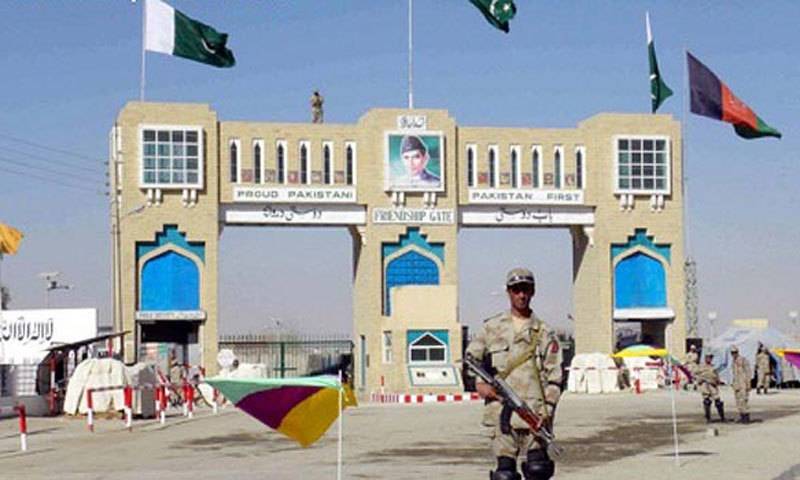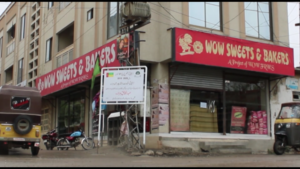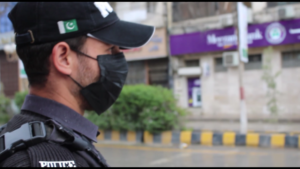
His mother has been ill for the past 15 days. He wakes up in the morning, ties his yellowish long turban and steps out of the house to go to the bazaar in the Chaman city of district Qilla Abdullah, leaving behind his old bed-ridden mother, his wife and his three children. Holding a walking cane, he moves towards his three-wheel vehicle.
“We have no groceries to prepare tonight's meal. Children are being fed leftover cakes, because of which Rihan got food poisoned", his wife desperately said to him as he was leaving.
He would walk through the streets of Kili sulaiman, a small village at Pak/Afghan [Border Point] in Chaman, wait at the border gate and get pairs of motor tires to transport to Quetta. He would make 1200 rupees a day. But these days he faces severe financial losses due to the coronavirus pandemic.
Gran Khan, 34, is an innately polio-crippled resident of Chaman who grew-up uneducated and got married in his teens. These days he is worried for his family which has been living in tough conditions ever since the border gates on Chaman point were closed to contain the spread of coronavirus.
“The border fencing has caused economic crises and hunger. I would go to Quetta from Chaman with couple of tires in my Suzuki CNG car, unload them in Satellite-town Quetta and would receive 1200 rupees for it”, said Gran.

Gran does not know why the border has been closed. He does not even know what coronavirus is. His mother's lungs-curing capsules cost 100 rupees, which he cannot afford anymore due to the financial strain resulting from the closure of the border. "Food and other necessities are hardly managed in the tiny amount I earn", he says, lamenting that he remains unable to fulfill the needs of his children.
Ayub Khan sits in the eastern area of Quetta (Satellite-Town) hoping that the border trade would be re-scheduled. He receives tires from people who transit them from Chaman border and then manage them in market of Multan and Lahore. “It has been 25 days, but I haven't received even a single pair of tires.
"I have 12 family members and I am the sole bread winner of my house. Through the tire business, I earn 3500 per day, but these days the business is closed. The savings I had are going to end soon and I now have no means to provide for my family. God knows when this misery will end", he told Naya Daur.
The border fencing has equally affected business sector, marketing and bilateral transition widely between the two countries.

"Leaving harsh effects, the eruption of coronavirus has disorganised world marketing, industrial production and small regional businesses. Borders are closed, hundreds of goods loaded trucks and containers are stopped near the Zero Point at both sides of borders", said Badr-U-din Kakar, President Chamber Of Commerce and small industries.
“Pakistan makes imports and exports on two borders of Balochistan with Iran (Taftan) and Afghanistan (Chaman). The finished goods produced in Pakistan’s industries are highly imported on Afghan border whereas other commodities are transited on both of the borders, so as Pakistan imports are made on Iran borders”.
Iranian Counsel General Muhammad Rafihi, while talking about the spread of coronavirus and the seize of border on a telephonic call stated that Iran was fully committed to combating Covid-19 in the country.
"We examined the situation in Wuhan, China and tried to develop a mechanism to fight the virus. Although we have lost several lives to the virus, we are gaining success in containing it", he said.
Iran has not announced fencing of its borders with any of the neighboring countries. It has a flow of transition on Afghan border even because, it manages a mechanism of World Health Organisation of screening and scanning the people who make mobility on border, said Rafihi council general Iran.
"Around 8,000 Pakistani citizens are still present in three cities of Iran: Zaydan, Qom, and Mashad. The Iranian government will facilitate them as its own citizens" he added.
Meanwhile, an opposition member of Balochistan Assembly says that the government failed at managing mechanism and strategy to combat the virus. China had earlier warned the world about the rapid spread of corona virus but the Pakistani administration did not take immediate notice of the warning, he said.
“We have no groceries to prepare tonight's meal. Children are being fed leftover cakes, because of which Rihan got food poisoned", his wife desperately said to him as he was leaving.
He would walk through the streets of Kili sulaiman, a small village at Pak/Afghan [Border Point] in Chaman, wait at the border gate and get pairs of motor tires to transport to Quetta. He would make 1200 rupees a day. But these days he faces severe financial losses due to the coronavirus pandemic.
Gran Khan, 34, is an innately polio-crippled resident of Chaman who grew-up uneducated and got married in his teens. These days he is worried for his family which has been living in tough conditions ever since the border gates on Chaman point were closed to contain the spread of coronavirus.
“The border fencing has caused economic crises and hunger. I would go to Quetta from Chaman with couple of tires in my Suzuki CNG car, unload them in Satellite-town Quetta and would receive 1200 rupees for it”, said Gran.

Gran does not know why the border has been closed. He does not even know what coronavirus is. His mother's lungs-curing capsules cost 100 rupees, which he cannot afford anymore due to the financial strain resulting from the closure of the border. "Food and other necessities are hardly managed in the tiny amount I earn", he says, lamenting that he remains unable to fulfill the needs of his children.
Ayub Khan sits in the eastern area of Quetta (Satellite-Town) hoping that the border trade would be re-scheduled. He receives tires from people who transit them from Chaman border and then manage them in market of Multan and Lahore. “It has been 25 days, but I haven't received even a single pair of tires.
"I have 12 family members and I am the sole bread winner of my house. Through the tire business, I earn 3500 per day, but these days the business is closed. The savings I had are going to end soon and I now have no means to provide for my family. God knows when this misery will end", he told Naya Daur.
The border fencing has equally affected business sector, marketing and bilateral transition widely between the two countries.

"Leaving harsh effects, the eruption of coronavirus has disorganised world marketing, industrial production and small regional businesses. Borders are closed, hundreds of goods loaded trucks and containers are stopped near the Zero Point at both sides of borders", said Badr-U-din Kakar, President Chamber Of Commerce and small industries.
“Pakistan makes imports and exports on two borders of Balochistan with Iran (Taftan) and Afghanistan (Chaman). The finished goods produced in Pakistan’s industries are highly imported on Afghan border whereas other commodities are transited on both of the borders, so as Pakistan imports are made on Iran borders”.
Iranian Counsel General Muhammad Rafihi, while talking about the spread of coronavirus and the seize of border on a telephonic call stated that Iran was fully committed to combating Covid-19 in the country.
"We examined the situation in Wuhan, China and tried to develop a mechanism to fight the virus. Although we have lost several lives to the virus, we are gaining success in containing it", he said.
Iran has not announced fencing of its borders with any of the neighboring countries. It has a flow of transition on Afghan border even because, it manages a mechanism of World Health Organisation of screening and scanning the people who make mobility on border, said Rafihi council general Iran.
"Around 8,000 Pakistani citizens are still present in three cities of Iran: Zaydan, Qom, and Mashad. The Iranian government will facilitate them as its own citizens" he added.
Meanwhile, an opposition member of Balochistan Assembly says that the government failed at managing mechanism and strategy to combat the virus. China had earlier warned the world about the rapid spread of corona virus but the Pakistani administration did not take immediate notice of the warning, he said.
